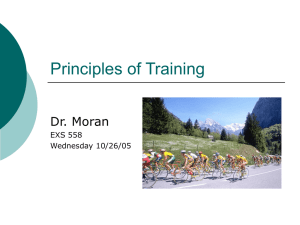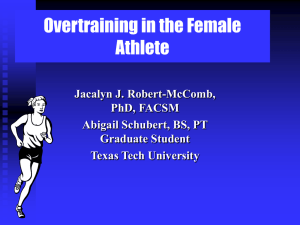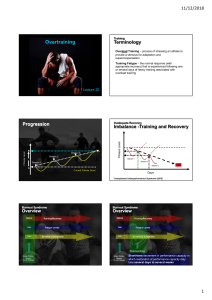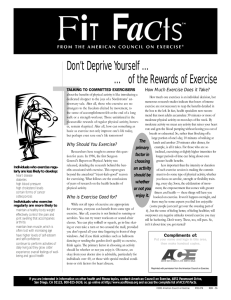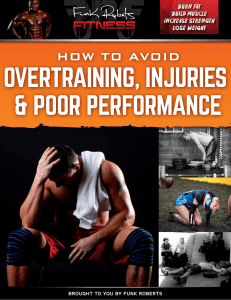F i t a c t s A
advertisement
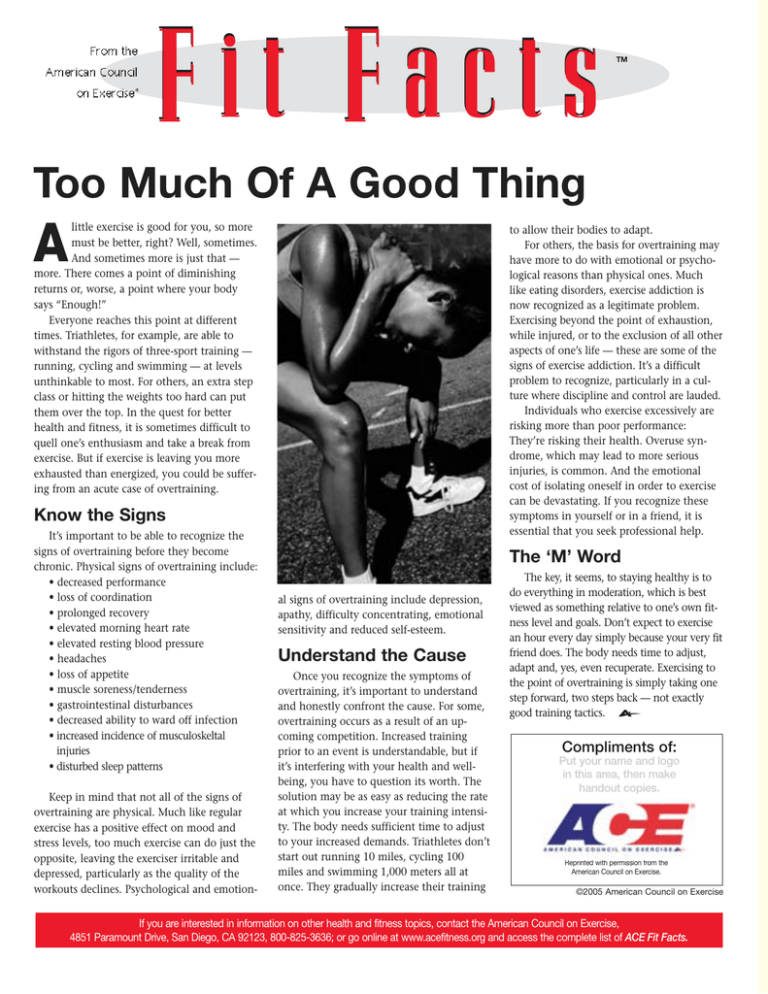
From the American Council on Exercise ® Fit Facts TM Too Much Of A Good Thing little exercise is good for you, so more must be better, right? Well, sometimes. And sometimes more is just that — more. There comes a point of diminishing returns or, worse, a point where your body says “Enough!” Everyone reaches this point at different times. Triathletes, for example, are able to withstand the rigors of three-sport training — running, cycling and swimming — at levels unthinkable to most. For others, an extra step class or hitting the weights too hard can put them over the top. In the quest for better health and fitness, it is sometimes difficult to quell one’s enthusiasm and take a break from exercise. But if exercise is leaving you more exhausted than energized, you could be suffering from an acute case of overtraining. A to allow their bodies to adapt. For others, the basis for overtraining may have more to do with emotional or psychological reasons than physical ones. Much like eating disorders, exercise addiction is now recognized as a legitimate problem. Exercising beyond the point of exhaustion, while injured, or to the exclusion of all other aspects of one’s life — these are some of the signs of exercise addiction. It’s a difficult problem to recognize, particularly in a culture where discipline and control are lauded. Individuals who exercise excessively are risking more than poor performance: They’re risking their health. Overuse syndrome, which may lead to more serious injuries, is common. And the emotional cost of isolating oneself in order to exercise can be devastating. If you recognize these symptoms in yourself or in a friend, it is essential that you seek professional help. Know the Signs It’s important to be able to recognize the signs of overtraining before they become chronic. Physical signs of overtraining include: • decreased performance • loss of coordination • prolonged recovery • elevated morning heart rate • elevated resting blood pressure • headaches • loss of appetite • muscle soreness/tenderness • gastrointestinal disturbances • decreased ability to ward off infection • increased incidence of musculoskeltal injuries • disturbed sleep patterns Keep in mind that not all of the signs of overtraining are physical. Much like regular exercise has a positive effect on mood and stress levels, too much exercise can do just the opposite, leaving the exerciser irritable and depressed, particularly as the quality of the workouts declines. Psychological and emotion- The ‘M’ Word al signs of overtraining include depression, apathy, difficulty concentrating, emotional sensitivity and reduced self-esteem. Understand the Cause Once you recognize the symptoms of overtraining, it’s important to understand and honestly confront the cause. For some, overtraining occurs as a result of an upcoming competition. Increased training prior to an event is understandable, but if it’s interfering with your health and wellbeing, you have to question its worth. The solution may be as easy as reducing the rate at which you increase your training intensity. The body needs sufficient time to adjust to your increased demands. Triathletes don’t start out running 10 miles, cycling 100 miles and swimming 1,000 meters all at once. They gradually increase their training The key, it seems, to staying healthy is to do everything in moderation, which is best viewed as something relative to one’s own fitness level and goals. Don’t expect to exercise an hour every day simply because your very fit friend does. The body needs time to adjust, adapt and, yes, even recuperate. Exercising to the point of overtraining is simply taking one step forward, two steps back — not exactly good training tactics. Compliments of: Put your name and logo in this area, then make handout copies. Reprinted with permission from the American Council on Exercise. ©2005 American Council on Exercise If you are interested in information on other health and fitness topics, contact the American Council on Exercise, 4851 Paramount Drive, San Diego, CA 92123, 800-825-3636; or go online at www.acefitness.org and access the complete list of ACE Fit Facts.
